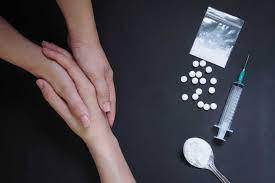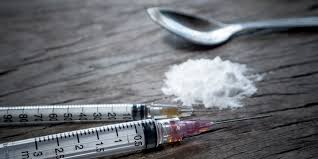How To Prevent Heroin Drug Relapse
Immediate
Placement Available at our Top-Rated Treatment Centers.
Please call us at (855) 410-4488. We work
with most major insurance providers and offer flexible payment
options!
Atrium Addiction Care offers a variety of treatment choices and programs for individuals struggling with drug or alcohol addiction. Our inpatient treatment programs are designed for those who have more severe substance use problems and require 24-hour care. We admit both voluntary and involuntary patients.

Drug relapse is a common phenomenon in life that affects individuals who have undergone addiction treatment. According to the National Institute on Drug Abuse, about 40-60% of people recovering from drug addiction will experience at least one instance of relapse. Heroin addiction in particular has been linked with high rates of relapse due to its highly addictive nature and withdrawal symptoms.
Preventing heroin drug relapse requires a comprehensive approach that addresses both physical and psychological factors involved in heroin addiction. Atrium Addiction Care offers various evidence-based treatments and therapies aimed at both preventing relapse and prevention reducing the risk of relapse prevention for those struggling with heroin addiction.
Through personalized care plans traditional outpatient services, patients are equipped with skills and strategies needed to resist relapse and to maintain sobriety long-term. In this article, we explore how the treatment center Atrium Addiction Care's programs traditional outpatient services can help prevent heroin drug relapse and provide insights into effective approaches for overcoming addiction challenges.
Understanding The Risk Factors For Relapse
Heroin drug relapse is a common occurrence among individuals undergoing addiction recovery. Identifying triggers that may lead a person to heroin relapse prevention recovery, is crucial in when people relapse and preventing it from happening. These triggers people relapse could be anything from stress, social pressure, or even the availability of drugs and other substances in their environment.
By identifying these factors and developing coping mechanisms to deal with them, individuals can better manage their cravings and prevent themselves trusted family members from falling back into addiction. Addressing emotional trauma is another important factor in preventing heroin drug relapse. Many people turn to drugs as a means of coping with painful experiences or emotions they cannot handle on their own.
Seeking professional help through therapy or counseling can help individuals address these underlying issues and develop healthier ways of dealing with them. In addition to professional help through traditional therapies such as cognitive-behavioral therapy (CBT), seeking alternative therapies like meditation, yoga, or acupuncture can also aid in preventing heroin drug relapse by helping individuals find inner peace and balance.
Maintaining accountability by regularly attending support group meetings or staying connected with a sponsor can also provide an added layer of motivation ongoing support opportunities and encouragement for those going through addiction recovery. Building resilience through exercise, healthy eating habits, and self-care practices can further strengthen one individual's ability to to resist temptation and maintain sobriety over the long term without succumbing to any form of substance abuse.
By being proactive about how to prevent heroin relapse and prevention addressing potential risk factors for relapse, individuals struggling with addiction can take control of their lives and achieve lasting recovery without having to go back down the long path of destruction caused by heroin use.
Developing A Supportive Network - how to prevent heroin relapse
Developing a Supportive Network is one of the most effective ways to prevent relapse in heroin drug and heroin relapse prevention recovery. This involves building relationships with individuals who can provide support, guidance and accountability throughout recovery. A supportive network can help an individual navigate through difficult times and stay on track towards their goals.
One way of using recovery support organization developing a supportive network is to follow up treatment and by finding accountability partners. These are people who will hold you accountable for your actions and ensure that you stay true to your commitment of staying sober. Accountability partners may be friends, family members or even professional counselors who understand the challenges of addiction recovery.
Another important aspect of developing a supportive network is building trust in relationships. Trust takes time to build but it’s essential for successful recovery. Individuals must work hard at being honest, reliable and consistent in order to gain the trust of others. This also means being open to receiving feedback from peers and making necessary changes as needed.
Joining support groups is another way of creating a supportive network during addiction recovery. Many communities offer various types of support groups for recovery community such as 12-step programs or peer-to-peer counseling sessions where individuals can connect with others going through similar struggles. Being part of these groups provides an opportunity to share experiences, learn coping skills, receive encouragement ongoing support opportunities and advice from others which helps foster a sense of belongingness recovery community.
Creating healthy boundaries: Setting clear boundaries with those around you helps protect against triggers that could lead to relapse. Seeking out positive influences: Surround yourself with people who have positive attitudes and lifestyles conducive to sobriety. Develop self-care habits: Establishing routines like exercising regularly and eating healthily promotes physical and mental health while reducing stress levels.
A strong support group or system acts as a safety net preventing users from seeking solace in drugs when feeling overwhelmed by life's stresses, providing hope they need to sustain long-term sobriety without fear of judgement or stigma attached to addiction history.
Establishing Healthy Coping Mechanisms - heroin addiction

Developing a supportive personal contact and support network elsewhere is critical for preventing heroin drug relapse. However, it is not enough to rely on personal contact with recovery support organization network others alone.
Establishing healthy coping mechanisms can provide an an individual's ability with the tools needed to prevent relapse when faced with a crisis occurs triggers major life events or stressors.
One effective method of coping is through mindful meditation. This technique focuses on being present in the moment and helps individuals manage their thoughts and emotions. By practicing mindfulness regularly, individuals can gain greater control over their responses to stressful situations, which reduces the likelihood of turning to drugs as a form of escape.
Another way to establish healthy coping mechanisms is by engaging in creative outlets such as art or music. These activities allow individuals to express themselves freely while providing a sense of accomplishment that promotes positive self-esteem.
Additionally, incorporating exercise into one's routine can also be beneficial both physically and mentally. Regular physical activity releases endorphins that improve mood and reduce anxiety levels.
Lastly, journaling practice has been shown to help individuals process and reflect on their experiences effectively. Writing down thoughts and feelings allows for introspection and provides insight into patterns or triggers that may lead to relapse.
Social activities are another helpful tool for establishing healthy coping mechanisms since they promote connection and support from peers close friends who understand what it means to overcome addiction.
Overall, developing healthy coping strategies is essential for maintaining long-term recovery from heroin addiction. Mindful meditation, creative outlets, exercise routines, journaling practices, social activities - these methods help individuals stay grounded during difficult times while promoting emotional regulation skills necessary for sustained success in sobriety.
Practicing Self-Awareness

Self-awareness is a crucial aspect of preventing heroin abuse and drug relapse. It involves being conscious of one's thoughts, emotions, and behaviors. Practicing self-awareness can help individuals recognize their triggers and learn how to manage them effectively.
Tips for practicing self-awareness include mindfulness techniques, journaling prompts, meditation exercises, self-reflection prompts, and therapy sessions. Mindfulness techniques involve paying attention to the present moment without judgment. This helps individuals become more aware of their thoughts and feelings in real-time.
Journaling prompts can be used as a tool for introspection and reflection. Writing down one's experiences and emotions can provide insight into patterns of behavior and thought processes that may contribute to relapse. Meditation exercises are another effective way to increase self-awareness. Regular practice can improve focus and concentration while reducing stress levels.
Self-reflection prompts encourage individuals to examine their values, goals, strengths, weaknesses, and beliefs. Finally, participating in therapy sessions with trained professionals can offer guidance on developing healthy coping mechanisms and strategies to prevent relapse.
In summary, practicing self-awareness is essential for individuals recovering from heroin addiction who want to avoid relapse. Mindfulness techniques, journaling prompts, meditation exercises, self-reflection prompts, and therapy sessions are all useful tools for increasing awareness of one's thoughts, emotions, and behaviors. By incorporating these practices into daily life routines consistently over time under professional supervision or guidance could make significant progress towards lasting recovery success rates without any chance of relapse episodes occurring anytime soon or at all!
Engaging In Regular Self-Care - heroin relapse prevention
Practicing self-awareness is an essential step towards preventing a heroin relapse or drug relapse. The process of identifying triggers, recognizing negative thought patterns and emotions, and understanding personal strengths and weaknesses helps individuals stay focused on their recovery journey. However, it's not enough to rely solely on self-awareness in the long-term.
Engaging in regular self-care is another crucial aspect of maintaining sobriety after overcoming addiction. This involves adopting healthy habits that promote physical, mental health, and emotional well-being. Stress management techniques such as exercise, meditation, or deep breathing can help manage anxiety levels effectively.
Mindfulness practice allows people to tune into their thoughts without judgment while relaxation techniques like massage therapy or acupuncture provide a calming effect on the body. Time and stress management skills also plays a significant role in preventing heroin drug relapse by reducing stress levels associated with daily responsibilities.
Creating a structured routine that prioritizes important activities like work, family time, and hobbies leaves little room for boredom or idleness - both of which can lead to temptation or negative thinking patterns. By incorporating these practices into one person's life regularly and making them part of a lifestyle change rather than just temporary solutions during times of crisis, individuals increase their chances of long-lasting success in their recovery journey.
Utilizing Professional Support - prevent relapse
Professional support is a crucial aspect of treatment center preventing heroin drug relapse. There are several therapeutic approaches that one can utilize how to in treatment center prevent heroin relapse and achieve long-term success in recovery from other drugs. Medication-assisted treatment (MAT) has shown promising results for individuals struggling with opioid addiction, as it helps reduce cravings and withdrawal symptoms.
Moreover, behavioral interventions such as cognitive-behavioral therapy (CBT), dialectical behavior therapy (DBT), and motivational interviewing have been successful in addressing the underlying psychological factors contributing people relapse due to substance use disorders. These therapies help individuals identify triggers and develop coping strategies to avoid relapse.
Recovery coaching is another effective method of using professional care and personal support network that provides the person with ongoing guidance and encouragement throughout the recovery process.
Furthermore, involving family members in the treatment process can be beneficial for both the individual in recovery or treatment and their loved ones. Family involvement in a person in a treatment program promotes understanding, communication, and support while reducing feelings of isolation and shame often associated with addiction.
In conclusion, utilizing professional support through various therapeutic approaches, medication-assisted treatment options, behavioral interventions, recovery coaching, and family involvement can significantly increase an individual or small group's chances of maintaining sobriety after heroin addiction.
Conclusion
Heroin addiction is a chronic condition that can be challenging to overcome. While achieving sobriety is an accomplishment in itself, the risk of relapse remains high. To prevent heroin abuse and drug relapse, it is essential to understand the factors that contribute to it and develop supportive networks and healthy coping skills and mechanisms.
Engaging in regular self-care practices helps maintain physical and emotional well-being while promoting self-awareness. Utilizing the professional care and support from addiction treatment centers and such services as Atrium Addiction Care can also the treatment center provide crucial resources for individuals seeking long-term recovery success.
With these strategies in mind, those struggling with heroin addiction can take proactive steps towards a treatment program preventing relapse and maintaining their hard-earned sobriety.
How can you reduce the risk of relapse?
[1] One common relapse prevention strategy includes medication and monitoring. Some individuals in the medical and general population relapse with alcohol or drugs that were problematic for a person. May 5, 2022.
How do you counter a relapse?
List the best ways of stopping relapse and staying involved with the recovery community. ... Keep an eye out for your own triggers. ... Take proper physical care. ... Do it to let things get out of you. = = = Find another goal.
What are the 4 D's of addiction?
Using 4Ds helps calm cravings.
